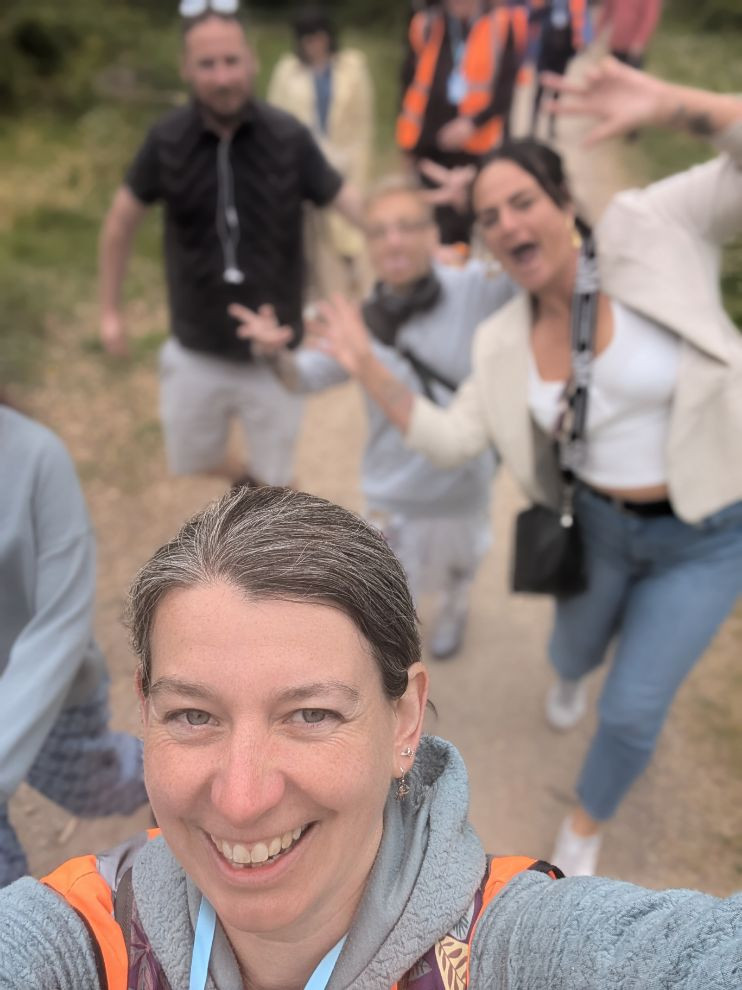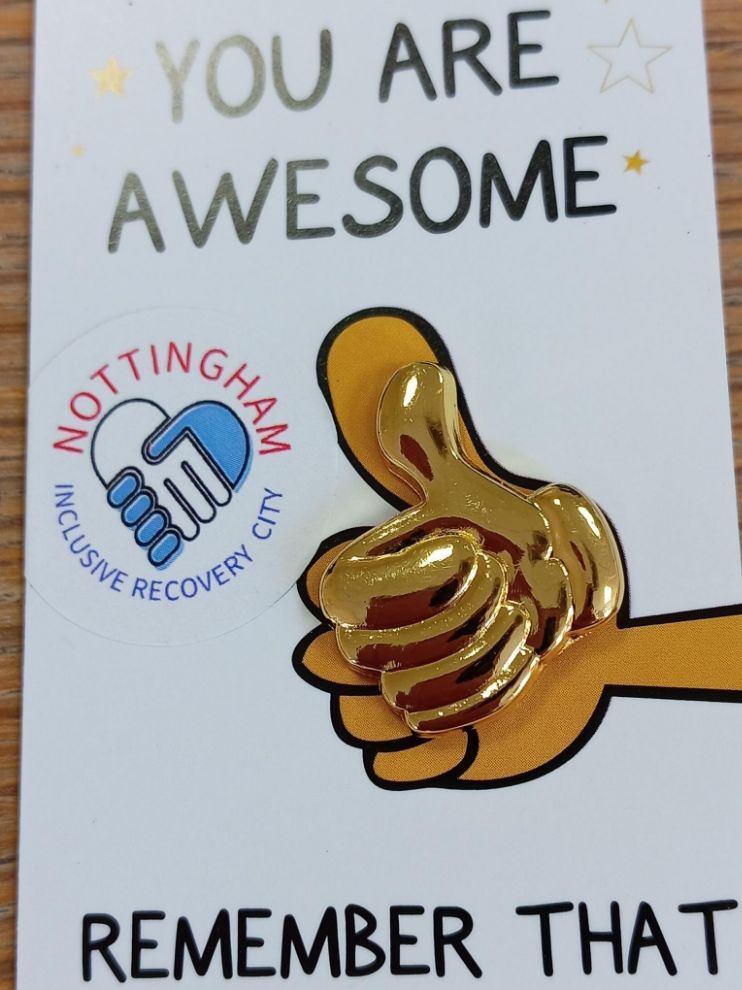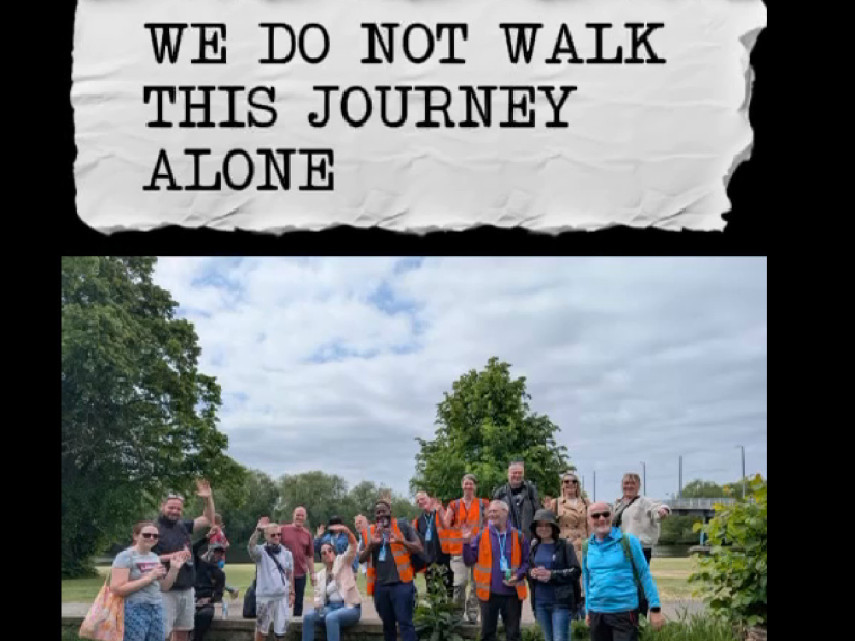Earlier this month, people from across Nottingham and Nottinghamshire gathered in unity and celebration for the first every Notts Recovery Walk and Family Fun Day, marking a vibrant milestone in the local Inclusive Recovery Cities (IRC) initiative. The event, held during Mental Health Awareness Month and Nottingham Walking Week, brought families, volunteers, and partner organisations together to highlight the strength, joy, and community spirit that fuels local recovery efforts.
Led by people with lived experience of recovery from addiction and supported by a growing network of community partners, the day featured a peaceful and positive walk through the city, followed by live music, games and family friendly activities at The Arboretum. But beyond the bunting and balloons, this event represented something much deeper: a visible commitment to building a city where recovery is supported and valued, stigma is challenged, and everyone has a role to play. This commitment was underpinned by a public signing of the IRC Nottingham Charter by Mayor of the East Midlands, Claire Ward.
IRC Nottingham and its sister initiative in the county are part of a national (and international) movement which is gaining momentum across 10 cities in the UK and beyond - it repositions Recovery as an attractive, achievable way of living, which brings mutual benefits to those communities in which it is supported.




A City-Wide Commitment to Recovery
Since its launch, IRC Nottingham has been working across sectors and neighbourhoods to promote recovery-friendly environments and inclusive community action. At its heart, IRC Nottingham champions a model where people in recovery are central to shaping the future—working alongside Nottingham’s council, universities, the NHS, police, faith groups, businesses, and community services.
Over the past six months, IRC Nottingham has made significant strides:
• Community Engagement: A core group comprising key organisations including Double Impact, the City Council , It’s In Nottingham and Al-Hurraya, meets regularly at Café Sobar, Double Impact’s alcohol-free venue, strengthening partnerships and planning outreach across Nottingham’s neighbourhoods. From Beechdale to Bulwell, IRC is connecting with grassroots initiatives and reaching out to communities often underrepresented in mainstream services.
• Events and Visibility: The Recovery Walk was just one of several planned public events, bringing recovery out of the shadows and into our thriving civic life. More are in development—including social events at Café Sobar, BAME family gatherings, and a special "Thank You" celebration this summer. There are also plans to make the Recovery Walk an annual civic tradition.
• Recovery Ally Training: Over 154 people in a range of organisations have now completed Recovery Ally training—an empowering, stigma-busting introduction to recovery that helps individuals understand the crucial role they can play as allies. Feedback has been overwhelmingly positive, with many participants going on to become Inclusive Recovery Champions.
• Asset Mapping: Work is underway to create a comprehensive, accessible database of recovery-friendly services and venues. With support from Nottingham College and the City Council, this will include an interactive map and window sticker scheme so residents can easily identify and support inclusive businesses.
• Collegiate Recovery: Nottingham University has been connecting with a separate but aligned national movement to create ‘Recovery Friendly Universities’ which helps ensure young people and others who identify as being in recovery can be helped to thrive without stigma within these settings.
• Media and Communication: A series of BBC features, a growing newsletter, and powerful videos are helping amplify recovery voices. IRC is also working on a joint communications strategy with Nottinghamshire IRC to share resources and success stories more widely.
What's Next?
Over the coming months, IRC Nottingham will continue delivering training, hosting community events, and building stronger partnerships across the city. Key goals include launching a regular Saturday afternoon social space, finalising the interactive map of recovery-friendly venues, and strengthening participation in key civic events.
With support from volunteers, local leaders, and people in recovery themselves, IRC Nottingham is not just meeting its goals—it's building a movement. One that reimagines recovery as something we do together, not in isolation.
As one recent Recovery Ally participant put it,
“I think the concept of being an “Ally” is very powerful. I didn’t take the opportunity to say it at the end, but that was my “takeaway” from today. There is strength in numbers, so the more people who take up this training, the more people we will have out there having meaningful conversations that could lead those who need it, into recovery. Keep doing what you’re doing!.”
The Recovery Walk may be over for this year—but the journey continues.
Latest News
- Aaron - My role as a Peer Support Worker in the Mental Health Team
19-11-2025
- Magnus - My role as a Peer Support Worker in the Mental Health Team
19-11-2025
- Cafe Sobar hosts 'Thank you' event and launch of 'Stronger Roots' identity for Inclusive Recovery Cities
19-11-2025
- Level Up your employment skills with these new dates for popular Mentoring Course
24-07-2025
- Introducing Notts Recovery Collective
03-06-2025
- Nottingham Walks Together for Recovery: A Growing Movement of Inclusion and Hope
21-05-2025
- One Step At A Time - Nottingham's first Recovery Walk & Family Fun Day
29-04-2025
- Double Impact Launches TimeOut: A New Gambling Recovery Service for Nottingham city
01-10-2024
- Nottinghamshire Hosts its First Inclusive Recovery Cities Event
01-10-2024
- New Recovery Service for Scunthorpe
28-06-2024
